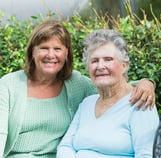 Communicating with someone recovering from a stroke or maintaining skills after a neurodegenerative diagnosis may be difficult. Changes in communicative abilities can be either expressive (the ability to speak or communicate) or receptive (the ability to understand spoken or written information), leading to breakdowns in communication. Any changes in communication can lead to feelings of frustration, isolation, or distress. We offer some fun summer activities to help practice word-finding and repair communication breakdowns. These activities require little if any, materials or preparation to engage!
Communicating with someone recovering from a stroke or maintaining skills after a neurodegenerative diagnosis may be difficult. Changes in communicative abilities can be either expressive (the ability to speak or communicate) or receptive (the ability to understand spoken or written information), leading to breakdowns in communication. Any changes in communication can lead to feelings of frustration, isolation, or distress. We offer some fun summer activities to help practice word-finding and repair communication breakdowns. These activities require little if any, materials or preparation to engage!
We’re going on a picnic
This activity is based on the scenario that we are planning a picnic. It works to target word-finding along with short-term memory and recall. For each letter of the alphabet, you will come up with a different item or object that will be brought with you on the picnic. Before you say your corresponding letter and item, you will say all of the other items that came before in alphabetical order.
For example:
Person 1: “A is for apples”
Person 2: “A is for apples, B is for Broccoli”
Person 3: “A is for apples, B is for Broccoli, C is for Coca-Cola”
…continuing this game for each letter of the alphabet. To best support the person with aphasia, you can provide a written reference for them to review, if needed. You can get as silly with this game as you wish!
Playing “I Spy” in Nature
If you find yourself outside this summer, engage in a game of I Spy! This game is appropriate for all ages. This activity can be used to practice ways to repair communication breakdowns. For example, you will select an item to “spy,” giving the person with aphasia clues relating to the item, helping them guess the object by name. This should also be reversed, where the person with aphasia will be giving semantic clues relating to the item. Clues should include the following: category, composition, function, location, appearance, parts, and additional information.
For example:
If you are giving the person with aphasia clues, you “spy” a squirrel. You can start by describing the item to the person with aphasia. You might say, “I spy an animal, it is found outside, it collects nuts, it is usually brown with a bushy tail, it climbs trees.” If the person with aphasia still struggles to recall the word, you can provide additional clues - including the first letter or sound of the word.
If the person with aphasia is providing the clues, you can assist in the following ways. Once they have selected the item they “spy” you can help walk them through different elements to give clues. You could ask, “what category does your item belong in? It is a type of…” and wait for them to provide a response. You may ask them what their item looks like, where is it found, what it is made of, etc.
Having a person with aphasia practice these skills can lead to increased success in managing breakdowns in communication later by providing “clues” in the same way to help describe an item or object they are referring to when it is their turn to “spy” an item.
For more information on stroke recovery and support, visit NEO-ACT (Northeast Ohio Adults Communicating Together)









